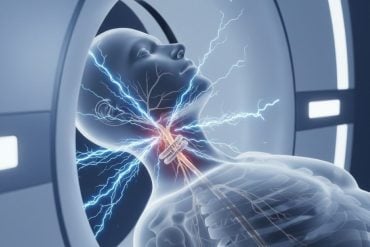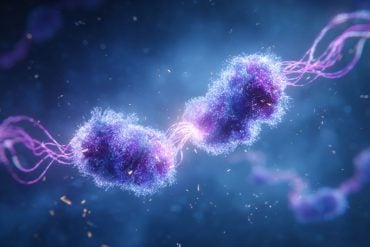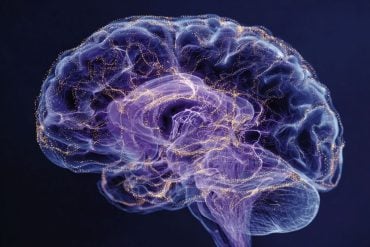Summary: New research shows that intermittent fasting, while beneficial for metabolic health, may slow hair regrowth by impairing hair follicle stem cells (HFSCs). In mice, fasting caused HFSCs to undergo apoptosis during extended fasting periods due to oxidative stress and free fatty acid buildup.
A small clinical trial suggested a milder effect in humans, with an 18% reduction in hair growth speed on a time-restricted diet. Antioxidants like vitamin E reduced the negative effects on HFSCs, highlighting potential solutions for mitigating these unintended outcomes.
Key Facts
- Stem Cell Stress: Fasting increases free fatty acids near hair follicles, triggering HFSC apoptosis.
- Human Impact: An 18% reduction in hair growth speed was observed during fasting in humans.
- Antioxidant Role: Vitamin E and increased antioxidant capacity protect HFSCs from fasting-induced damage.
Source: Cell Press
Intermittent fasting has proven benefits for metabolic health, but a new study shows that it could slow hair growth—at least in mice.
Researchers report December 13 in the Cell Press journal Cell that mice subjected to intermittent fasting regimes showed improved metabolic health but slower hair regeneration compared to mice with 24/7 access to food.
A similar process might occur in humans, based on a small clinical trial that the team also conducted, but it’s likely to be less severe since humans have a much slower metabolic rate and different hair growth patterns compared to mice.

“We don’t want to scare people away from practicing intermittent fasting because it is associated with a lot of beneficial effects—it’s just important to be aware that it might have some unintended effects,” says senior author and stem cell biologist Bing Zhang of Westlake University in Zhejiang, China.
In addition to its metabolic benefits, previous studies have shown that fasting can improve the stress resistance of stem cells associated with blood, intestinal, and muscle tissue, but little is known about how it impacts peripheral tissues such as skin and hair. Zhang’s team hypothesized that fasting might also be beneficial for skin tissue regeneration, the process by which old and damaged cells are replaced.
To test this, they examined hair regrowth in mice that were shaved and then subjected to different intermittent fasting regimes. Some mice were fed on a time-restricted feeding (TRF) schedule that involved 8 hours of food access and 16 hours of fasting each day, while other mice were subjected to alternate-day feeding (ADF).
They were surprised to find that fasting inhibited hair regeneration. While control mice that had unlimited access to food had regrown most of their hair after 30 days, mice on both intermittent fasting regimes showed only partial hair regrowth after 96 days.
The team showed that this inhibited hair growth occurs because hair follicle stem cells (HFSCs) are unable to cope with the oxidative stress associated with switching from using glucose to fat. HFSCs go through phases of activity and dormancy, and hair regrowth depends on these cells becoming active.
While the control mice’s HFSCs began to become activated around day 20 post-shaving and remained active until their hair had regrown, the intermittent fasting mice’s activated HFSCs underwent apoptosis (programmed cell death) during extended fasting periods.
Using genetic engineering methods, the team showed that this fasting-induced apoptosis was driven by an increased concentration of free fatty acids near the hair follicles, which caused a build-up of harmful radical oxygen species within the HFSCs. Free fatty acids also caused human HFSCs to undergo apoptosis in vitro.
“During fasting, adipose tissue starts to release free fatty acids, and these fatty acids enter the HFSCs that were recently activated, but these stem cells don’t have the right machinery to use them,” says Zhang.
In comparison, epidermal stem cells, which are responsible for maintaining the epidermal skin barrier, were unaffected by intermittent fasting. The major difference between these stem cell types is that epidermal stem cells have a higher antioxidant capacity.
When the team tested whether antioxidants could mitigate the effects of fasting on hair growth, they showed that both topical application of vitamin E and genetic upregulation of antioxidant capacity helped HFSCs survive fasting.
The team also conducted a small clinical trial with 49 healthy young adults to examine whether fasting similarly affects hair regrowth in humans. They showed that a time-restricted diet involving 18 hours of fasting per day reduced the average speed of hair growth by 18% compared to controls, but larger studies would be needed to verify this effect given the study’s small sample size and short duration (10 days).
“The human population is very heterogeneous, so the effects might be different for different people,” says Zhang.
“Mice also have a very high metabolic rate compared with humans, so fasting and metabolic switching have a more severe effect on mouse HFSCs. We see a milder effect in humans—there are still apoptotic stem cells, but many HFSCs survive. So, there is still hair regrowth; it’s just a little bit slower than usual.”
In future work, the researchers plan to collaborate with local hospitals to investigate how fasting impacts other types of stem cells in the skin and other body systems.
“We plan to examine how this process affects the regeneration activities in other tissues,” says Zhang.
“We also want to figure out how fasting impacts skin wound healing and identify metabolites that could help the survival of HFSCs and promote hair growth during fasting.”
Funding:
This research was supported by the National Natural Science Foundation of China, the Key R&D Program of Zhejiang, the Westlake Laboratory of Life Sciences and Biomedicine, the Research Center for Industries of the Future (RCIF), and the Center of Synthetic Biology and Integrated Bioengineering at Westlake University.
About this intermittent fasting and genetics research news
Author: Kristopher Benke
Source: Cell Press
Contact: Kristopher Benke – Cell Press
Image: The image is credited to Neuroscience News
Original Research: Open access.
“Intermittent Fasting Triggers Interorgan Communication to Suppress Hair Follicle Regeneration” by Bing Zhang et al. Cell
Abstract
Intermittent Fasting Triggers Interorgan Communication to Suppress Hair Follicle Regeneration
Intermittent fasting has gained global popularity for its potential health benefits, although its impact on somatic stem cells and tissue biology remains elusive.
Here, we report that commonly used intermittent fasting regimens inhibit hair follicle regeneration by selectively inducing apoptosis in activated hair follicle stem cells (HFSCs).
This effect is independent of calorie reduction, circadian rhythm alterations, or the mTORC1 cellular nutrient-sensing mechanism.
Instead, fasting activates crosstalk between adrenal glands and dermal adipocytes in the skin, triggering the rapid release of free fatty acids into the niche, which in turn disrupts the normal metabolism of HFSCs and elevates their cellular reactive oxygen species levels, causing oxidative damage and apoptosis.
A randomized clinical trial (NCT05800730) indicates that intermittent fasting inhibits human hair growth.
Our study uncovers an inhibitory effect of intermittent fasting on tissue regeneration and identifies interorgan communication that eliminates activated HFSCs and halts tissue regeneration during periods of unstable nutrient supply.






